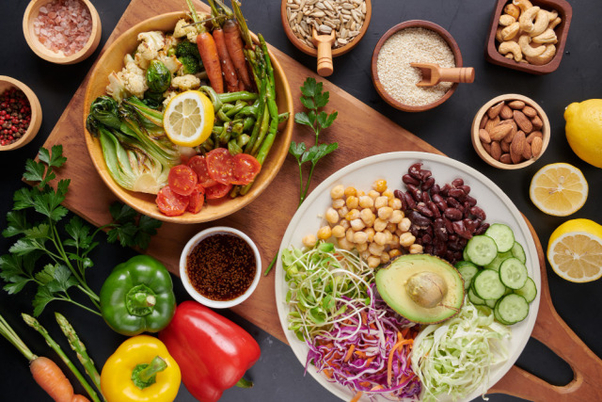
In today’s fast-paced world, maintaining a balanced diet is crucial for overall health and well-being. A balanced diet provides your body with the essential nutrients it needs to function correctly, boosts your immune system, supports mental clarity, and provides sustained energy throughout the day. But what exactly does it mean to “eat a balanced diet,” and how can you make sure you’re doing it right? Let’s explore the fundamental components and benefits of a balanced diet.
What is a Balanced Diet?
A balanced diet consists of a variety of foods in the right proportions to provide the necessary vitamins, minerals, and other nutrients your body requires. It includes a healthy mix of carbohydrates, proteins, fats, vitamins, and minerals. The goal is to consume different types of foods in sufficient quantities to meet your body’s daily energy and nutritional needs while maintaining a healthy weight.
The Components of a Balanced Diet
Whole grains, vegetables, fruits, and legumes are excellent sources of complex carbohydrates. Unlike simple carbohydrates (like those found in sugar and processed foods), complex carbs provide longer-lasting energy and are rich in fiber, which aids digestion and maintains blood sugar levels.
Proteins: Proteins are essential for the growth, repair, and maintenance of body tissues. They also play a crucial role in immune function. Incorporate lean meats, poultry, fish, eggs, dairy products, nuts, seeds, and legumes into your diet to meet your protein requirements. Plant-based proteins like tofu, lentils, and quinoa are also excellent options.

Fats: Contrary to popular belief, fats are necessary for a balanced diet, but it’s important to choose the right kinds. Healthy fats, such as those found in avocados, nuts, seeds, olive oil, and fatty fish, provide essential fatty acids that support brain function, hormone production, and cell health. Avoid trans fats and limit saturated fats, which are found in processed and fried foods.

Vitamins and Minerals: Vitamins (such as A, C, D, E, and B-complex) and minerals (like iron, calcium, potassium, and magnesium) are vital for various bodily functions, including immunity, bone health, and metabolism. Consuming a wide range of fruits, vegetables, whole grains, and lean proteins ensures you get an adequate supply of these nutrients.

Fiber: Fiber is crucial for digestive health, helping to prevent constipation, reduce cholesterol levels, and control blood sugar levels. Include plenty of fruits, vegetables, whole grains, nuts, and seeds in your diet to ensure you get enough fiber.

Water: Staying hydrated is an often overlooked but critical component of a balanced diet. Water is essential for nearly every bodily function, from regulating body temperature to flushing out toxins. Aim to drink at least 8 glasses (about 2 liters) of water a day, more if you are physically active or live in a hot climate.

Benefits of a Balanced Diet
Supports Healthy Weight Management: Eating a variety of nutrient-dense foods helps maintain a healthy weight by balancing the intake and expenditure of energy. A balanced diet also reduces the risk of overeating and the craving for unhealthy snacks.
Boosts Immune Function: A diet rich in fruits, vegetables, whole grains, lean proteins, and healthy fats strengthens the immune system, helping the body fight infections and diseases more effectively.
Improves Mental Health: There is a strong link between diet and mental well-being. Foods rich in omega-3 fatty acids, antioxidants, and vitamins, such as fish, nuts, berries, and leafy greens, can improve mood, reduce anxiety, and enhance cognitive function.
Promotes Heart Health: A balanced diet low in saturated fats and cholesterol and high in fruits, vegetables, and whole grains can lower the risk of cardiovascular diseases. Foods like salmon, walnuts, and flaxseeds, which are rich in omega-3 fatty acids, help reduce inflammation and promote heart health.
Enhances Energy Levels: Eating balanced meals throughout the day prevents energy slumps and keeps you active and productive. Complex carbohydrates, proteins, and healthy fats provide a steady supply of energy, avoiding the highs and lows associated with sugar and processed foods.
Supports Healthy Aging: A nutrient-rich diet supports healthy skin, bones, and muscles, reducing the risk of age-related conditions like osteoporosis, heart disease, and cognitive decline.
Tips for Eating a Balanced Diet
Include a Variety of Foods: Ensure your meals are colorful and diverse, including fruits, vegetables, lean proteins, whole grains, and healthy fats.
Control Portion Sizes: Be mindful of portion sizes, especially when it comes to high-calorie foods like nuts, oils, and sweets.
Limit Processed Foods and Sugars: Reduce the consumption of processed and sugary foods that are low in nutrients and high in empty calories.
Plan Your Meals: Plan meals in advance to ensure you have a balanced diet throughout the week. This also helps in managing time and reduces the temptation to eat unhealthy foods.
Listen to Your Body: Pay attention to hunger and fullness cues to avoid overeating and maintain a healthy relationship with food.
Conclusion
Eating a balanced diet is not about strict dietary limitations or depriving yourself of the foods you love. By making small changes to your daily eating habits and choosing a variety of nutrient-dense foods, you can pave the way for a healthier, happier life. Remember, moderation is key, and every step toward a balanced diet is a step toward a better you.
Embrace the journey of healthy eating and feel the difference it brings to your life!
